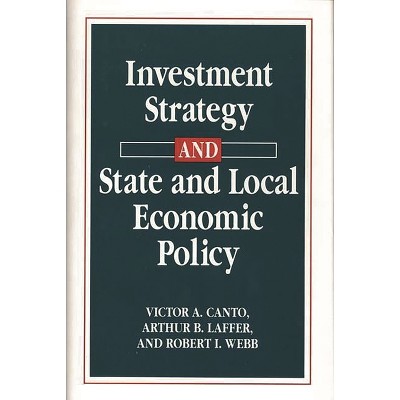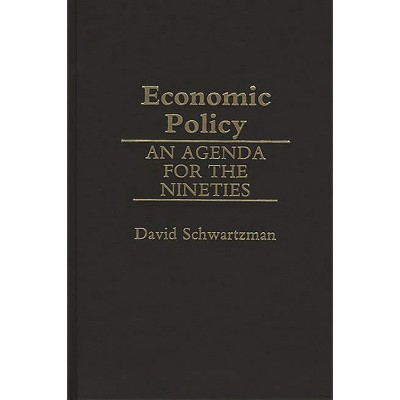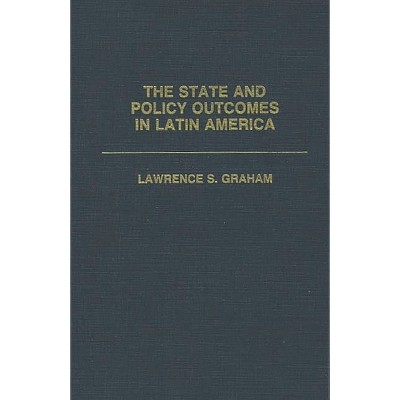Sponsored

Ideas and Economic Policy in Latin America - (History; 60) by Anil Hira (Hardcover)
In Stock
Sponsored
About this item
Highlights
- How are the economic policies which developing countries adopt selected and how do they change?
- About the Author: ANIL HIRA is Assistant Professor of Political Science and Latin American Studies at Simon Fraser University in Vancouver, British Columbia.
- 200 Pages
- Business + Money Management, Development
- Series Name: History; 60
Description
About the Book
How are the economic policies which developing countries adopt selected and how do they change? Who are the key players in economic development policies? Professor Anil Hira answers these questions head on by suggesting new ways of looking at how ideas affect economic policy. He first traces the way that ideas become wedded to interest groups over time, and he interprets the debate over economic development policy as a series of changes in idea-interest networks, often marked by crises. He then looks closely at economic idea entrepreneurs.
Through concrete case studies of networks in Latin America, with a focus on Chilean economic policy, Hira explains not only how ideas are introduced, but which ones win out in the economic policy process and why. He introduces the concept of economic knowledge networks to understand groups of economists wedded to certain sets of ideas, such as neoliberalism or structuralism. Economic knowledge networks extend beyond Latin America and can be found in such diverse places as Indonesia and Egypt. Hira identifies the characteristics of these groups and shows how they create political action through their organizational activities and ideas. Hira not only sheds light on how ideas affect economic policy, but also provides an inside story on the groups responsible for the new economic revolution that is sweeping Latin America and transforming the regional economy. An important resource for scholars, students, and policy makers involved with international political economy, emerging economies, and Latin American studies.
Book Synopsis
How are the economic policies which developing countries adopt selected and how do they change? Who are the key players in economic development policies? Professor Anil Hira answers these questions head on by suggesting new ways of looking at how ideas affect economic policy. He first traces the way that ideas become wedded to interest groups over time, and he interprets the debate over economic development policy as a series of changes in idea-interest networks, often marked by crises. He then looks closely at economic idea entrepreneurs.
Through concrete case studies of networks in Latin America, with a focus on Chilean economic policy, Hira explains not only how ideas are introduced, but which ones win out in the economic policy process and why. He introduces the concept of economic knowledge networks to understand groups of economists wedded to certain sets of ideas, such as neoliberalism or structuralism. Economic knowledge networks extend beyond Latin America and can be found in such diverse places as Indonesia and Egypt. Hira identifies the characteristics of these groups and shows how they create political action through their organizational activities and ideas. Hira not only sheds light on how ideas affect economic policy, but also provides an inside story on the groups responsible for the new economic revolution that is sweeping Latin America and transforming the regional economy. An important resource for scholars, students, and policy makers involved with international political economy, emerging economies, and Latin American studies.Review Quotes
?Anil Hira's highly readable book....The book represents a useful way of thinking about the appeal of ideas without necessarily entering into debates about their normative merits or affinity with the preferences of the population. Few other analyses of the role of ideas, especially on Chile, can claim such normative impartiality.?-Comparative Politics
?Within this analytic approach, Hira has helped to clarify the process through which economists influence econmic policy by identifying seven attributes that appear to make certain groups of economists more influential than others....Hira has thus offered a contribution to our understanding of the impact of ideas on economic policy, especially as it relates to the role of the economists in a popularizing their theories of development.?-Journal of Interamerican Studies and World Affairs
"Anil Hira's highly readable book....The book represents a useful way of thinking about the appeal of ideas without necessarily entering into debates about their normative merits or affinity with the preferences of the population. Few other analyses of the role of ideas, especially on Chile, can claim such normative impartiality."-Comparative Politics
"Within this analytic approach, Hira has helped to clarify the process through which economists influence econmic policy by identifying seven attributes that appear to make certain groups of economists more influential than others....Hira has thus offered a contribution to our understanding of the impact of ideas on economic policy, especially as it relates to the role of the economists in a popularizing their theories of development."-Journal of Interamerican Studies and World Affairs
About the Author
ANIL HIRA is Assistant Professor of Political Science and Latin American Studies at Simon Fraser University in Vancouver, British Columbia.Shipping details
Return details
Trending Non-Fiction

















